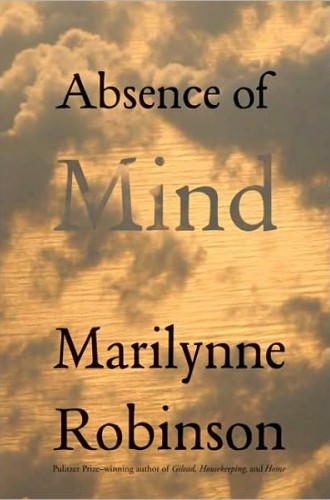Science without wonder
Marilynne Robinson's first nonfiction volume since The Death of Adam, is both demanding and elegant. Few writers today combine such intellectual breadth and literary style. Readers expecting a defense of theism against the new atheist fundamentalism, however, will be disappointed.
Robinson engages figures who formulaically employ a crabbed account of religion as a foil to their sunny positivism, yet it's neither atheism nor positivism with which Robinson quarrels here. Her real target is aggressive reductionism, an approach that severely limits the scope of relevant experience in its account of reality and that breaks complex systems into isolated smaller units, asserting that an explanation of parts generates a comprehensive account of the whole.
Read our latest issue or browse back issues.
The human experience that Robinson wants to rescue from reductionism is interiority. She explicitly challenges the reductionist assumption that "the experience and testimony of the individual mind is to be explained away, excluded from consideration when any rational account is made of the nature of human being and of being altogether." These allegedly rational accounts, and the extrascientific claims extrapolated from them, are problematic not only from the perspectives of theology and philosophy but from that of science as well.
Robinson insists that she doesn't question proper science or its methods. Indeed, she reads enough in science to recognize when entomologist E. O. Wilson is badly misconstruing Werner Heisenberg's uncertainty principle; she knows more science than most reductionists seem to know of theology or philosophy. Robinson does, however, take exception to "the methods of a kind of argument that claims the authority of science or highly specialized knowledge . . . yet does not practice the kind of discipline or self-criticism for which science is distinguished."
Based on her Terry Lectures at Yale University, Robinson's essays proceed more thematically than in stepwise progression, and they end in a sense of restored wonder rather than at a destination. To readers who finish the book who are intrigued but uncertain of what they've just experienced, I suggest another go. This brief, subtly constructed text rewards careful attention.
The first essay challenges the metaphor of the conceptual threshold, that historical moment when ignorance and darkness are displaced by the true understanding that is available, if not to all humanity, then at least to an enlightened vanguard. For true believers in the threshold metaphor, this description is flattering and unproblematically good, more along the lines of Alexander Pope's "God said, Let Newton be! and all was Light" than W. B. Yeats's "Locke sank into a swoon; / the garden died; / God took the spinning jenny / out of his side." The polemicists of reductionism find no evidence in the prethreshold cultural accomplishments of a garden; they find evidence only of noxious swamps.
This is where the current polemic against religion fits: rewarmed 18th-century position statements codified in an anthropology that Robinson aptly designates "a hermeneutics of condescension." She points out that the threshold metaphor is often employed with a sense of urgency, as if the "new view" is truly new and utterly compelling while the "old view," typically presented in the crudest terms, is overdue for debunking. This signature motif of modernity is notable for its pervasive misrepresentations or complete ignorance of earlier states of knowledge. "Contempt for the past," Robinson notes, "surely accounts for a consistent failure to consult it."
The second essay's theme is altruism, a term coined by positivism's founder, Auguste Comte. Some neo-Darwinians now consider altruism an illusion of the mind, similar to any motivation not reducible to genetic advantage. E. O. Wilson, for example, sees the altruist as engaging in only "lying, pretense and deceit." William Hamilton proposes an algebraic inequality—an untestable calculation based on shared genes and risk aversion—as the real logic behind every seemingly unselfish act. To paraphrase W. H. Auden, there is no selflessness, only various envies.
"A central tenet of the modern world view," Robinson observes, "is that we do not know our own minds, our own motives, our own desires. And—an important corollary—certain well-
qualified others do know them." Even the currently fashionable theory of memes—virallike particles of culture forever attaching themselves to human brains—follows the pattern, portraying the mind as an unwitting host to parasitic ideas. That memes are impervious to empiric detection leaves their theorists unfazed, as the theory supports what is assumed, rather like psychoanalytic theory a century ago.
Robinson's third essay provides a fascinating alternate genealogy of Freudian theory. Freud chose to universalize sexual experience in contrast to the particularizing, racialized anthropologies of late 19th-century Europe. Freud, an expatriate Czech Jew in a Vienna abuzz with pan-Germanism, proposed a world of constant, inescapable threats to the bourgeois self, requiring a strict rationing of personal awareness and a deep suspicion of motives.
What scientific racists and Freudians shared, however, was the assumption that the mind is not trustworthy. For Freud's opponents, the mind was a passive conduit of a supposed racial inheritance. For Freud, it was a cauldron of hidden urges and desires, tenuously constrained by insensible psychic structures, the existence of which Freud asserted but could not demonstrate. That both schools claimed to be scientific and not metaphysical seems preposterous today. The suggestion, perhaps, is that reductionist accounts of the mind may someday share their fate.
In her final essay, Robinson considers alternatives to the "declension, from the ethereality of mind/soul as spirit to the reality of mind/brain as a lump of meat," a move that recapitulates "precisely the antique dualism these writers who claim to speak for science believe they reject and refute." After all, reductionist accounts of consciousness come fully loaded with their own inherent problems.
Why, for example, do the proposed seductions of the mind—like altruism or interiority—so appeal to us? Indeed, why do they exist at all? If our brain, like nature, is concerned with nothing more than physical survival, would it not be more efficient to leave that fact unobscured? What convoluted purposes are served by the deceptions of mind (to which all but an enlightened few are prey)?
The mind, even that of the reductionist, is self-aware, questioning itself and nature. If its activity rests in physical processes, that doesn't mean that a biological account of the brain will be comprehensive, definitive or deflating of what we have, until recently, called "human nature." Nor do the characteristics of identifiable physical parts fully account for the nature of whole systems. (The book's novel dissection of the story of Phineas Gage, whose traumatic brain injury is formulaically retold in neuroscience texts, exposes one of the inherent limits of the reductionist approach.)
The flaw at the heart of parascience, Robinson believes, is the assumption that a reductionist account of reality is "in every important sense sufficient." She applauds the science that respects its epistemological and practical limits. Such science contains a sense of awe and wonder that is conspicuously absent from most parascientific literature, which seems to view nature as a problem to be solved.
According to Robinson, the gulf between parascientific thought, on the one hand, and religion or philosophy, on the other, is found in the word solve. She notes: "It does seem as though, for the purposes of these writers, science is the conquest of mystery." To accomplish this conquest, the reductionist must dismiss insoluble questions—what others call mystery—as irrelevant, as if insolubility were reason enough to dismiss a question. "We may never know," Robinson concludes, "why gravity is so much weaker than, in theory, it should be, or know why we are only one among any number of actual and potential universes. But every real question is fruitful, as the history of human thought so clearly demonstrates."
It may well be that the alleged war between science and religion is, if anything, a misconstrual of one another's language. Perhaps a little Wittgenstein—the latter Wittgenstein—would go a long way toward reducing misunderstanding. Still, there will always be some people—brittle fundamentalists and aggressive reductionists, for example—whose differences are unbridgeable. Robinson hopes that those who can speak to one another will remain in conversation and not assume that the triumphalist enclaves speak for the whole.






